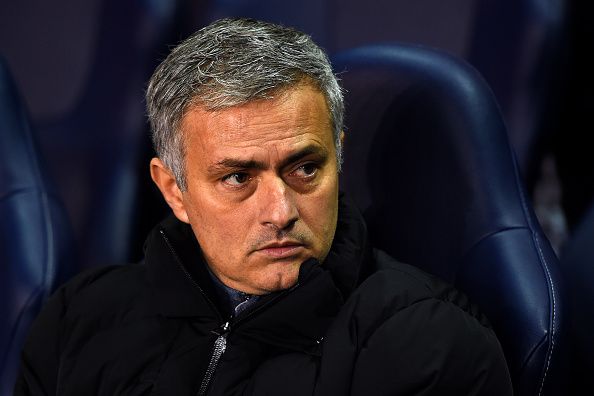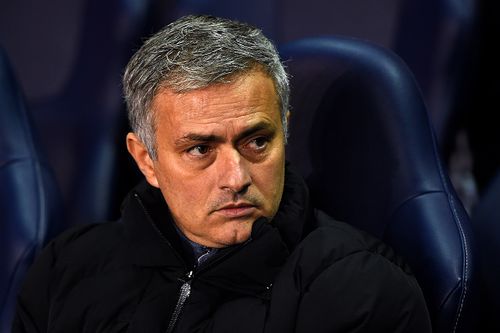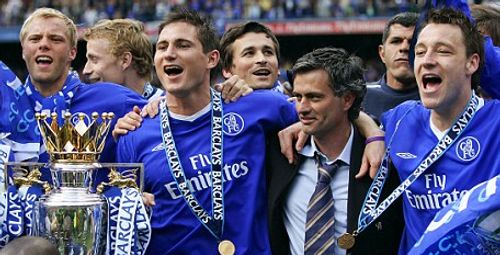
Why Jose Mourinho is the most successful manager in the 21st century

As Chelsea boss Jose Mourinho turns 52, we celebrate the Special One’s remarkable coaching career by analysing what makes him the most successful manager of the 21st Century. Despite being dumped out of this season’s FA Cup in humiliating circumstances last weekend, it’s shaping up to be another successful season at Stamford Bridge as the Blues race towards another Premier League title.
Mourinho’s men are also the odds-on favourites to lift the Capital One Cup at Wembley on March 1 while the club will also be quietly confident about lifting Europe’s biggest trophy by winning this season’s Champions League. If the Blues do go on to achieve this, it will be largely thanks to the influence of their infectious manager.
Mourinho is a football fan’s delight. The relentless media storm surrounding his every move provides the most dramatic of soap operas and the entire world is hooked as they wait to see the latest developments. However, behind all that bravado lies a world-class manager and that remains the root with the global fascination surrounding him. There is no denying that Mourinho will be remembered as one of the greatest managers to ever grace the sport and his unique story makes his achievements all the more captivating.
How Mourinho became The Special One
The details of Mourinho’s formative years are common knowledge but the significance of his time working under Sir Bobby Robson which saw a young Jose follow the former England boss from Lisbon to Barcelona via Porto, cannot be overestimated. Unlike many top coaches, Mourinho enjoyed a very modest playing career, but the advice of Robson served as a fantastic learning curve for an evidently extremely ambitious upcoming talent. The Portuguese tactician soaked this in, perfecting his craft – ready to unleash it in later years.
It wasn’t until 2004 that Mourinho shot to worldwide notoriety and his successful run to the Champions League trophy with Porto simply must be regarded as one of the great fairytale stories of recent years. The iconic images of Jose celebrating on the Old Trafford touchline, after beating Manchester United in the first knockout phase, would be just one in a serious of memorable moments from the eccentric manager.
Soon after winning the Champions League, Mourinho rocked up at Stamford Bridge. It took the new Chelsea boss just one interview to cement his place in English football history, thanks to his infamous ‘Special One’ claim. Confidence should not be confused with arrogance, though and it didn’t take long for the Blues boss to mark his footprint on the Premier League.
Mourinho revolutionized tactics and formations in the Premier League
Mourinho became an instant hit in West London, guiding the Blues to a first league title in 50 years after just one season in charge. Chelsea retained the Premier League crown 12 months later, confirming the Portuguese manager’s legendary status.
Perhaps more impressive, though, was the manner in which Chelsea had won those back-to-back titles. Whilst a keen eye in the transfer market cannot be overlooked - the additions of Didier Drogba, Petr Cech and Arjen Robben were all instant hits at Stamford Bridge – the most notable aspect of the club’s Premier League dominance had been Mourinho’s tactical nous.
The common attribute shared with all world-class managers is their ability to stay one step ahead of the game and Mourinho’s revolutionary tactics not only played a major part in knocking Manchester United off their perch, it also helped rewrite the blueprint for success throughout the Premier League. Mourinho ignored the 4-4-2 formation, opting instead to utilise a five-man midfield that utilised penetrative wing play along with the use of an anchor in front of the defence – Claude Makelele.
The Frenchman’s disciplined defensive cover allowed the likes of Frank Lampard to bomb forward from the central areas, providing Chelsea with an array of attacking options. Simultaneously, it offered the Blues a defensive stability far greater than anything the Premier League had ever seen before as the team conceded just 37 goals over those two title-winning seasons combined.

From conquering England to conquering Europe
For one reason or another, Mourinho’s relationship with owner Roman Abramovic reached an untenable conclusion and the Special One departed; the fact Abramovic later reconciled with the Portuguese coach is a glowing testament to what a phenomenal manager he is. An equally successful spell in Italy ensued and ended in mind-blowing fashion as Mourinho led a distinctly average Inter Milan side to the Champions League trophy, completing an unprecedented Italian treble in the process, before moving to the Spanish capital to manage a Real Madrid squad that he was always destined to coach at some stage.
Some critics will suggest that one Liga title and one Copa del Rey in three years isn’t good enough for a club of Real Madrid’s stature and would therefore conclude that Mourinho’s time at the Santiago Bernabeu was unsuccessful. However, it is worth noting he was up against arguably the greatest club team we’ve ever seen in Pep Gaurdiola’s Barcelona.
Those glory years at the Camp Nou had been the reward for a generation of reshaping a club from top to bottom and the fact Mourinho was able to break that stranglehold, if only on a temporary basis, was a monumental achievement in itself. In order to beat Barcelona, Mourinho’s Madrid had to reach new heights. In that title-winning campaign of 2011/12, Los Blancos registered a record-breaking 100 points – additionally setting record for the most wins and goals in La Liga history. The Special One had raised the bar in a fourth different country.
Unfinished business with Chelsea in the EPL
Upon his return to England, Mourinho openly declared that his side wouldn’t win the title in 2013/14. Instead, he set his side the target of lifting the Premier League trophy this season and, as we edge towards the business end, that prediction is looking spot on.
| POS | TEAM | P | W | L | GD | POINTS |
|---|---|---|---|---|---|---|
| 1 | Chelsea | 22 | 16 | 2 | 32 | 52 |
| 2 | Man City | 22 | 14 | 3 | 23 | 47 |
| 3 | Southampton | 22 | 13 | 6 | 21 | 42 |
| 4 | Man Utd | 22 | 11 | 4 | 15 | 40 |
| 5 | Arsenal | 22 | 11 | 5 | 14 | 39 |
That foresight not only highlights an almost telepathic reading of a situation, it also shows the visionary characteristics that make Mourinho stand out as one of football’s true geniuses. Likewise, he has shown tactical adaptability during his second stint at Stamford Bridge and is doing so whilst overseeing a transition from one set of superstars to the next.
The manner in which Chelsea have coped with the loss of record scorer Lampard has been sublime and the inspired acquisition of Cesc Fabregas underlines the brilliance of Mourinho. Make no mistake; this new look team carries a lot of similar traits to the previous generation, but fans can also revel in a whole host of subtle changes.
In an era when the level of opposition is greater than ever, Chelsea now boast of the quality to overcome anything that the other sides in the Premier League sides throw at them. The central partnership of Fabregas and Nemanja Matic are far more versatile than any other while the depth in quality is simply mouth-watering. Assuming the Blues do lift the Premier League crown in May, it could be heralded as one of Jose’s greatest successes.
Is Mourinho truly the greatest manager in Europe?
That flexibility is something that only a handful of managers are truly blessed with and the fact Mourinho has achieved so much with five different teams (counting Chelsea as two separate generations) is a glowing reference to his ability.
In terms of best current managers, there are very few to rival Mourinho. Guardiola has undoubtedly played a huge role in the recent successes of Barcelona and Bayern Munich, but both clubs were already amongst Europe’s elite and the lack of a plan ‘B’ has to go against the Spaniard. Meanwhile, the likes of Arsenal’s Arsene Wenger have failed to keep up with the rapid evolution of the game. Carlo Ancelotti, on the other hand, has often enjoyed his success thanks to the groundwork completed by Mourinho.
At just 52, the only thing missing from Mourinho’s managerial CV is a Champions League triumph with Chelsea. If he does achieve that dream, he’d become the first man in history to win it with three separate clubs – surely cementing his place as the greatest all-round manager ever.
Considering his immense quality as a head coach, we certainly wouldn’t bet against him.